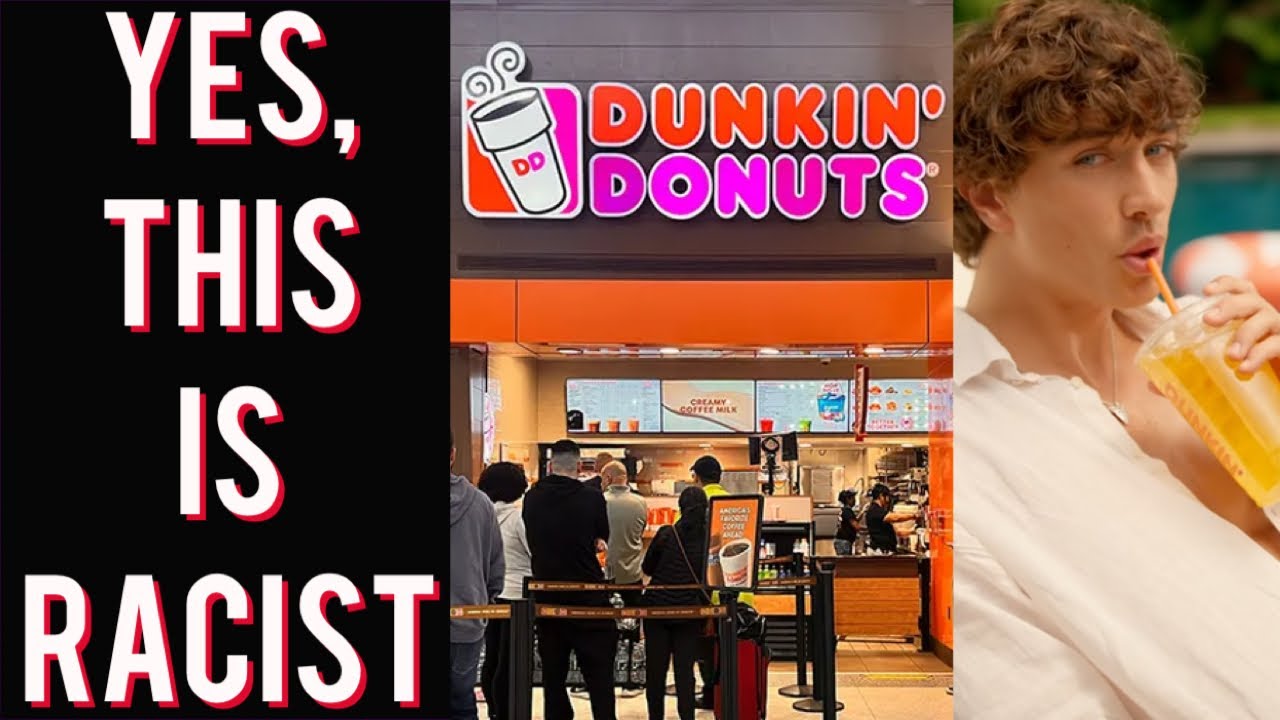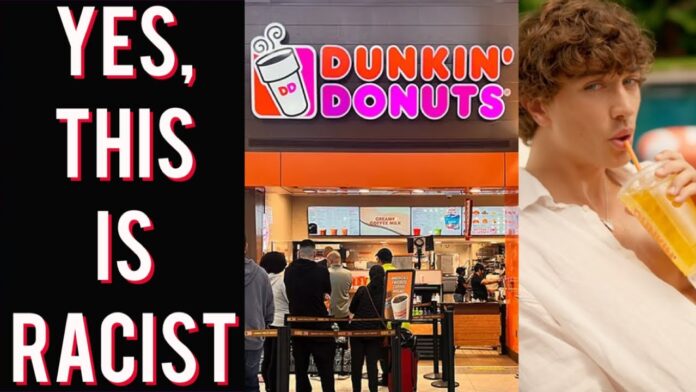🚨 TikTok is LOSING IT over Dunkin’ Donuts’ new ad!
First, Sydney Sweeney’s jeans ad shook the internet…
Now, Dunkin’s “Genetics” commercial is sparking an even bigger uproar.
Is it genius marketing… or a PR disaster waiting to happen?
The real reason people are furious will blow your mind.

Woke TikTok Rages Over Dunkin’ Donuts’ “Genetics” Ad: Is It Really Worse Than Sydney Sweeney’s?
In the ever-polarized landscape of social media, a new firestorm has erupted, this time targeting a seemingly innocuous 35-second Dunkin’ Donuts advertisement. Released on July 29, 2025, the ad for the chain’s Golden Hour Refresher features The Summer I Turned Pretty star Gavin Casalegno, who casually attributes his “golden summer” tan to “genetics” while lounging poolside. The line, meant to tie into the drink’s summery vibe, has instead ignited a fierce backlash on TikTok, with users accusing the ad of promoting Eurocentric beauty standards and even echoing eugenics rhetoric. Coming hot on the heels of a similar controversy surrounding American Eagle’s Sydney Sweeney campaign, the Dunkin’ ad has been dubbed by some as “worse” due to its timing and perceived insensitivity. What exactly is fueling this outrage, and is it a case of overreaction or a legitimate critique of modern advertising? Let’s dive into the controversy, the social media uproar, and the broader cultural implications.
The Ad That Sparked a Storm
The Dunkin’ Donuts ad, titled “King of Summer,” is a lighthearted pitch for the Golden Hour Refresher, a tropical lemonade drink. In the 35-second spot, Casalegno, a 25-year-old actor with blonde hair and blue eyes, delivers a tongue-in-cheek monologue: “Look, I didn’t ask to be the King of Summer, it just kinda happened. This tan? Genetics. I just got my color analysis back. Guess what? Golden summer, literally. Every time I drink a Golden Hour Refresher, it’s like the sun just finds me.” The ad, posted across Dunkin’s social media channels, has racked up 1.8 million views on TikTok alone, but the comments section tells a different story.
TikTok users swiftly pounced on the word “genetics,” drawing parallels to American Eagle’s July 2025 campaign featuring Sydney Sweeney. In that ad, Sweeney, also blonde and blue-eyed, promoted a denim line with the tagline “Sydney Sweeney Has Great Jeans,” a pun on “genes.” She says, “Genes are passed down from parents to offspring, often determining traits like hair color, personality, and even eye color. My genes are blue.” Critics labeled it “racist, sexist, and eugenics-coded,” accusing it of glorifying whiteness and invoking historical connotations of genetic superiority tied to Aryan ideals. Dunkin’s ad, released just days later, poured fuel on the fire, with comments like “Why are ads so obsessed with genetics all of a sudden?” (28,000 likes) and “What in the Sydney Sweeney did I just watch?” capturing the outrage.
TikTok’s “Woke” Backlash: What’s Driving It?
The backlash centers on the perception that both ads use “genetics” to celebrate physical traits associated with white beauty standards—blonde hair, blue eyes, and, in Casalegno’s case, a flawless tan. TikTok users have called the language a “dog whistle” for white supremacist themes, pointing to historical contexts where genetics discussions, particularly about light-skinned, blue-eyed individuals, were tied to Nazi propaganda and eugenics movements. One user commented, “IT HASNT EVEN BEEN 7 BUSINESS DAYS SINCE THE LAST EUGENICS AD,” while another questioned, “Genuinely what does a drink have to do with genetics???” Some went further, vowing to boycott Dunkin’, with remarks like “I’ll never have Dunkin’ Donuts again” and “Dunkin just joined the boycott list with Starbucks.”
The timing of the ad, so close to American Eagle’s controversy, amplified the reaction. Users argued that Dunkin’s choice to echo similar language was either tone-deaf or deliberately provocative, especially in a post-2024 U.S. election climate where cultural divides are stark. Critics also took issue with the “King of Summer” phrasing, with one TikToker noting its oddity amid recent “No Kings” protests against perceived authoritarianism in the U.S. The ad’s focus on Casalegno’s appearance, without clear relevance to the drink, fueled accusations of shallow marketing that prioritizes aesthetics over substance.
The Other Side: Defenders and Counterarguments
Not everyone sees the ad as problematic. On X, users like @MissVega8888 celebrated it, posting, “WOKE IS OVER!!! Dunkin’ Donuts just released an ad with a white, Christian, conservative man talking about his great genetics and liberals are losing their minds again!” Others echoed this, with @EliseMcCue noting, “I cannot wait for the liberal outrage of not getting the sarcasm here.” Supporters argue the ad is a playful nod to Casalegno’s The Summer I Turned Pretty character, Jeremiah, known for his tan and outdoorsy charm, and that “genetics” is a harmless reference to his looks, not a political statement.
Some dismiss the backlash as an overreach, citing the Baader-Meinhof phenomenon—where noticing something once makes it seem more prevalent. A TikTok user suggested the similarity to Sweeney’s ad is coincidental, arguing, “If this had been released before the American Eagle ad, we would not be having this conversation.” Others on X, like @dissidentwest, urged companies to “double and triple down” against “woke mobs,” framing the ads as a return to traditional beauty standards that appeal to “normal” consumers. Posts on platforms like Twitchy praised Dunkin’ for not caving to pressure, with one user joking, “Woke fools are losing their minds again. Check out this guy whose whole day has been wrecked over the word ‘genes’—poor thing!”
Cultural Context: A Shift in Advertising?
The controversy reflects broader tensions in advertising and culture. In recent years, brands faced pressure to embrace inclusivity, featuring diverse models and avoiding stereotypes. However, some argue this “woke” approach alienated mainstream audiences, leading to a perceived backlash. X posts like @myacatt51’s claim, “It’s nice that companies are trying to appeal to normal people again,” suggest the Dunkin’ and American Eagle ads signal a return to idealized beauty standards—blonde, blue-eyed, and conventionally attractive. Critics counter that this shift dismisses marginalized groups, reinforcing outdated ideals.
The timing post-2024 election, with cultural divides heightened, adds fuel. Supporters see the ads as a rejection of “woke” overreach, while critics view them as insensitive, especially given historical connotations of “genetics” in racial contexts. The debate mirrors earlier controversies, like Bud Light’s 2023 Dylan Mulvaney backlash, highlighting the tightrope brands walk in polarized times.
Dunkin’ and American Eagle’s Silence
Neither Dunkin’ nor Casalegno has responded to the backlash, a stance mirrored by American Eagle and Sweeney. This silence contrasts with past corporate apologies but aligns with some X users’ advice to “never capitulate to angry wokesters.” The lack of comment suggests both companies may be weathering the storm, betting on the controversy fading as viewership (1.8 million for Dunkin’s TikTok post) drives brand visibility.
Why Worse Than Sweeney’s Ad?
TikTok users calling Dunkin’s ad “worse” point to its timing and lack of context. Sweeney’s ad, while controversial, used “genes” as a pun for jeans, tied to a clothing campaign. Dunkin’s mention of “genetics” feels less relevant to a drink, making it seem gratuitous to critics. One user noted, “At least American Eagle had a pun. Dunkin’ just threw ‘genetics’ in for no reason.” The rapid succession of the ads—days apart—also heightened perceptions of a troubling trend, with comments like “What’s up with ads and the word genetics rn” garnering 40,000 likes.
Broader Implications for Advertising
The uproar raises questions about language in marketing. Are brands like Dunkin’ and American Eagle intentionally pushing boundaries, or are they simply out of touch? Some argue the ads reflect a cultural shift, with companies betting on appealing to conservative audiences tired of “woke” messaging. Others see a miscalculation, noting that alienating progressive consumers risks long-term brand loyalty. The boycott calls, while vocal, may have limited impact, as one X user noted: “The left doesn’t spend in significant levels to tip the scale. They just love to scream.”
The controversy also highlights TikTok’s role as a cultural amplifier. With 1.8 million views, the platform turned a niche ad into a lightning rod, showcasing its power to shape narratives. Yet, the polarized reactions—outrage on TikTok, celebration on X—suggest brands face a fragmented audience, where pleasing one group risks alienating another.
What’s Next for Dunkin’?
Dunkin’ faces a choice: stand firm, as American Eagle did, or pull the ad and apologize, a common response in past controversies. The brand’s silence suggests confidence in riding out the storm, especially as supporters rally behind the ad’s lighthearted intent. Casalegno, relatively unscathed compared to Sweeney, who faced intense personal attacks, may avoid further spotlight by staying quiet.
Final Thoughts
The Dunkin’ Donuts “genetics” ad controversy, amplified by its proximity to Sydney Sweeney’s American Eagle campaign, underscores the volatile intersection of advertising, culture, and social media. TikTok’s “woke” outrage paints the ad as a reckless echo of harmful tropes, while defenders see it as a bold rejection of over-sensitivity. Whether a misstep or a calculated move, the ad has sparked a conversation about beauty, race, and corporate responsibility. As brands navigate this divided landscape, the fallout serves as a reminder: in 2025, every word counts, and TikTok is watching.
